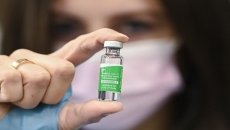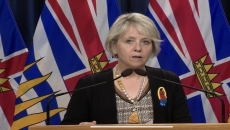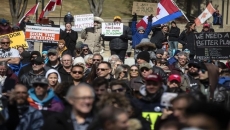Federal health officials are re-evaluating what has to happen before Canada can allow fully vaccinated people to enter the country or entirely reopen the border to international travellers, says chief public health officer Dr. Theresa Tam.
Tam was among federal officials from Health Canada and the Canada Border Services Agency appearing at an emergency meeting of the House of Commons health committee Friday, which focused heavily on when the 14-month-long border closure will finally come to an end.
Tam said it's not just about deciding what fully immunized people can do, it's also about Canada's own pandemic situation, including vaccine coverage at home, case rates and hospital capacity, and the fact there is no standard yet for proving that you are, in fact, fully vaccinated.
"We're very actively examining the policies related to vaccinated travellers or fully vaccinated travel," she said at the three-hour long committee hearing.
"I do think that Canada is probably on a good trajectory in terms of its epidemiology and our own vaccination coverage and so I do think that between now and moving toward the fall, we would expect some shifts in that policy."
She said Canada may, however, continue to require travellers to get tested "given the potential for variants that may have escaped vaccines."
Canada imposed border restrictions in March 2020, as the COVID-19 pandemic surged around the world, and added testing and some hotel quarantine requirements this winter.
Travel volumes at land and border crossings have been a mere fraction of normal. Last summer travel was down more than 90 per cent compared to the year before. Since January 1 of this year, about 3.9 million people arrived in Canada by land or air, compared to 94 million people during the same period of 2019.
Liberal MP Marcus Powlowski, whose Thunder Bay-Rainy River riding in northwestern Ontario runs along the United States border, said there are thousands of businesses that rely on American tourists in the summer.
"If there's no American tourists this year, they're going to go bankrupt, and a lot of people will lose their livelihood," he said. "I think it's a reasonable question: when can we expect to hear when fully vaccinated people, especially Americans, will be allowed into Canada?"
Tam said it was a reasonable question, and that some changes to policies are coming soon.
More than one-third of the U.S. population is now fully vaccinated, and within that country, officials have given fully vaccinated people permission to travel without quarantining.
Canada hasn't yet lifted restrictions for anyone regardless of vaccination status, and Powlowski said it's time to do so.
The European Union moved this week to allow fully vaccinated tourists to travel there.
Alberta Conservative MP John Barlow asked for data showing the impact quarantine hotels are having in Canada, which officials could not provide, leaving Barlow frustrated.
"You have no data that tells me that it curbs the spread of the virus any more than quarantining at home, and there's no plan to end the hotel quarantine," he said. "So is this just a means to deter travel?"
Iain Stewart, the president of the Public Health Agency of Canada, said PHAC is monitoring infection rates of travellers quite closely. He said the hotel quarantine policy — which the federal government calls "government-approved accommodations" — is not just meant to be a deterrent.
He said the policy is actually there to prevent people arriving in Canada on a plane and then getting on a domestic flight, carrying COVID-19 with them.
"I also mentioned earlier that the number of people arriving at airports is substantially higher and (they are) more likely to be infected than at the land border," said Stewart. "And those are the motivating factors behind the government-approved accommodations."






